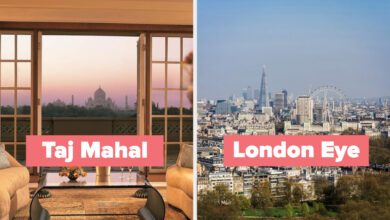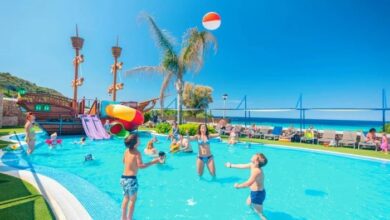Luxury Hotels In Stuttgart With A Modern Twist
Luxury Hotels in Stuttgart with a Modern Twist reimagines the quintessential hotel experience. This exploration delves into the specifics of creating a contemporary luxury hotel, from architectural design to guest experiences. Stuttgart, a city rich in history, provides a captivating backdrop for this innovative approach to hospitality.
We’ll examine the key elements of modern luxury, including sustainable practices, innovative amenities, and strategically chosen locations. This approach will highlight how these hotels can stand out in the competitive Stuttgart market, attracting discerning travelers seeking a unique and unforgettable stay.
Defining Modern Luxury in Stuttgart Hotels
Modern luxury in Stuttgart hotels transcends the traditional, embracing a contemporary aesthetic while maintaining a high standard of comfort and service. This approach prioritizes design innovation, sophisticated amenities, and a strong connection to the city’s cultural identity. The focus is on creating an experience that is both visually appealing and functionally superior, reflecting the dynamism and progressive spirit of Stuttgart.This modern luxury approach is distinct from traditional luxury, which often emphasizes historical design elements and a more formal atmosphere.
Modern luxury hotels, instead, use contemporary materials and design principles to create a more open, adaptable, and often technologically advanced environment. The experience focuses on intuitive design and seamless technology integration, offering a feeling of sophistication and ease.
Modern Luxury Design Elements
Modern luxury hotels in Stuttgart showcase a blend of contemporary design elements. Key features include clean lines, minimalist aesthetics, and the strategic use of natural materials like wood and stone. Large windows or glass facades often frame stunning city views, while sophisticated lighting schemes highlight architectural details and create an ambiance of sophistication. The integration of cutting-edge technology, from smart room controls to high-speed internet, further enhances the guest experience.
Furthermore, the use of locally sourced materials, showcasing the region’s craftsmanship, can enhance the overall modern luxury appeal.
Examples of Modern Architectural Styles
Stuttgart hotels frequently incorporate contemporary architectural styles, often drawing inspiration from the region’s industrial heritage. Examples include sleek, minimalist designs using glass and steel, reflecting the modern cityscape. Alternatively, some hotels might employ a more organic aesthetic, utilizing natural light and incorporating elements of nature within the building. The use of biomorphic shapes, reminiscent of natural forms, is another prevalent style, enhancing the sense of spaciousness and openness.
Comparison with Traditional Luxury
Traditional luxury hotels in Stuttgart often feature ornate décor, rich fabrics, and a more formal atmosphere. Modern luxury, in contrast, prioritizes clean lines, minimalist design, and a more adaptable space. The amenities may overlap in terms of high-quality service and luxurious toiletries, but the overall ambiance and architectural approach differ significantly. Modern luxury emphasizes a more streamlined and sophisticated experience, appealing to a clientele seeking a blend of comfort and cutting-edge design.
Sustainability and Eco-Consciousness
Sustainability is increasingly integrated into modern luxury hotel design. Eco-conscious features include the use of locally sourced materials, energy-efficient appliances, and water conservation measures. Hotels may utilize renewable energy sources, promote recycling programs, and implement strategies for reducing their environmental footprint. The integration of these eco-conscious elements not only enhances the hotel’s environmental responsibility but also elevates its modern luxury appeal, attracting environmentally conscious guests.
This demonstrates a commitment to both the environment and the evolving preferences of modern travelers.
Hotel Concept Comparison
| Hotel Concept | Modern Design Elements | Eco-Conscious Features |
|---|---|---|
| The “Urban Nest” | Sleek, minimalist design with large windows, natural materials (wood, stone), and integrated technology. | Energy-efficient appliances, rainwater harvesting, and local sourcing of food and materials. |
| The “Green Canopy” | Biomorphic shapes, natural light, and expansive outdoor spaces integrated into the design. | Solar panels, vertical gardens, and waste reduction programs. |
| The “Industrial Loft” | Exposed brickwork, industrial-style lighting, and a blend of modern and vintage elements. | Recycled materials, energy-efficient lighting, and partnerships with local organic farms. |
Hotel Amenities and Services
Modern luxury hotels in Stuttgart go beyond the expected, recognizing that today’s travelers prioritize experiences over mere accommodations. They understand that amenities and services are crucial to creating a truly unforgettable stay, reflecting the city’s sophisticated and vibrant atmosphere. This section will delve into the key components that define these modern luxury hotels.Stuttgart’s modern luxury hotels are thoughtfully designed to cater to the needs of discerning travelers, embracing a balance between timeless elegance and innovative approaches.
These hotels offer a spectrum of experiences, from bespoke services to state-of-the-art technology integrations, all aimed at exceeding guest expectations.
Key Amenities Catering to Modern Travelers
Modern travelers expect more than just comfortable rooms; they desire amenities that enhance their experience and seamlessly integrate with their lifestyle. This includes thoughtful touches such as high-speed internet access, personalized service, and unique experiences. These elements reflect the hotel’s commitment to providing a luxurious and unforgettable experience for its guests.
- High-Speed Internet and Digital Connectivity: Reliable and fast Wi-Fi is no longer a luxury but a necessity. Guests expect seamless connectivity for work and personal use, enabling them to stay connected to the world while enjoying their stay.
- Personalized Service: Going beyond basic hospitality, modern luxury hotels offer personalized service that anticipates guest needs. This might include arranging specific experiences, providing tailored recommendations, or even offering customized dining options.
- Fitness Centers and Wellness Amenities: Modern travelers often prioritize health and well-being. High-quality fitness centers, spa services, and wellness programs are crucial to meeting these demands.
- Gourmet Dining Options: Luxury hotels are increasingly recognizing the importance of culinary experiences. This includes not only exquisite restaurants but also thoughtfully curated menus and fine dining options to suit different palates and dietary needs.
Unique and Innovative Services
Modern luxury hotels in Stuttgart often incorporate innovative services to create a truly unique experience. These can range from concierge services that help guests discover local hidden gems to exclusive partnerships with local businesses. Such services enhance the overall experience, offering something beyond the standard hotel stay.
- Concierge Services: These go beyond basic recommendations. Highly trained concierges can arrange personalized experiences, from exclusive tours and restaurant reservations to arranging transportation to local attractions, exceeding guest expectations with their expertise.
- Partnership with Local Businesses: Strategic partnerships with local businesses and artisans create unique experiences for guests. This could involve offering exclusive access to workshops, collaborations with local chefs, or even special offers on local products and services.
- Sustainability Initiatives: Modern luxury hotels increasingly incorporate eco-friendly practices. This could involve using sustainable materials, reducing energy consumption, and offering eco-conscious amenities to appeal to environmentally aware guests.
Personalized Service
Personalization is a key differentiator in modern luxury hotels. Understanding guest preferences and proactively catering to their needs creates a highly personalized and memorable experience. Hotels use various strategies to achieve this, from guest profiling to bespoke service offerings.
- Guest Profiling: Collecting and analyzing guest data allows hotels to tailor services to individual preferences. This might include pre-arrival communications that acknowledge past stays or preferences.
- Bespoke Service Offerings: Hotels offer tailored services based on guest preferences. This could involve arranging special events, providing personalized recommendations, or even offering curated experiences tailored to each guest’s unique interests.
Essential Amenities in Stuttgart Luxury Hotels
The table below Artikels essential amenities offered in three different luxury hotels in Stuttgart, categorized by price range.
| Hotel | Amenities | Price Range |
|---|---|---|
| The Ritz-Carlton, Stuttgart | High-speed internet, personalized concierge, gourmet dining, spa, fitness center, exclusive access to local experiences | €500-€1000 per night |
| Four Seasons Hotel Stuttgart | High-speed internet, bespoke service, business center, various dining options, fitness center, wellness programs | €300-€700 per night |
| Hotel de Rome | High-speed internet, concierge service, on-site restaurant, modern fitness facilities, eco-conscious practices | €150-€300 per night |
Technology Integration
Technology plays a significant role in enhancing guest experiences in modern luxury hotels. Integrating technology seamlessly into every aspect of the stay creates a more personalized and efficient experience for the guest.
- Mobile Check-in and Check-out: Modern technology allows guests to manage their stay via mobile devices, reducing wait times and enhancing convenience. This is a popular feature among many luxury hotels.
- Smart Room Technology: Smart rooms allow guests to control lighting, temperature, and entertainment systems via mobile devices. This offers a more convenient and personalized experience.
Importance of High-Speed Internet and Digital Connectivity
In today’s digital age, high-speed internet and digital connectivity are essential for modern luxury hotels. They are not merely a convenience but a critical component of the guest experience. Reliable connectivity enables guests to stay connected to their professional and personal lives.
“High-speed internet is no longer a desirable amenity; it’s an expectation.”
Location and Accessibility
A modern luxury hotel in Stuttgart must strategically position itself to capitalize on the city’s vibrant atmosphere and key attractions. Optimal accessibility to public transportation and convenient car access are paramount for guest convenience, while the hotel’s location should seamlessly integrate with the city’s modern architectural landscape. This crucial element reflects the hotel’s brand identity and enhances the overall guest experience.The ideal location offers a balance between proximity to cultural landmarks, dining experiences, and entertainment venues, while maintaining a sense of tranquility and privacy.
This careful consideration of surrounding environment is critical for creating a truly exceptional guest experience.
Potential Locations in Stuttgart
The choice of location is a pivotal decision in establishing a modern luxury hotel. Different areas of Stuttgart offer varying advantages and drawbacks.
- Near the city center: This location provides easy access to major attractions like the Mercedes-Benz Arena, the Staatsgalerie Stuttgart, and the Wilhelma zoo. However, it often comes with higher prices for real estate and potential noise pollution. This can create a bustling atmosphere that is both exciting and potentially disruptive for guests seeking tranquility. A location in this area could offer the perfect blend of urban excitement and luxurious retreat, but must be carefully considered to balance the advantages and drawbacks.
For instance, a hotel in the heart of Stuttgart’s commercial district might offer direct access to shops and restaurants, but may also be affected by the city’s busy traffic patterns.
- In the upscale neighborhoods of Degerloch or Vaihingen: These districts offer a more residential atmosphere, which can be attractive to guests seeking a quieter retreat. The distance from the city center can affect access to major attractions, but convenient public transport links can mitigate this. This could potentially provide a more serene and exclusive environment. However, the distance from the city center might pose a challenge for guests who prefer to be immersed in the city’s cultural scene.
- Along the Neckar River: This picturesque location offers a tranquil setting with stunning views. Accessibility to the city center and major attractions is good, though specific areas along the river may have differing levels of noise or traffic. A riverside location offers an opportunity to showcase the natural beauty of Stuttgart, blending urban luxury with the serenity of the surrounding landscape.
Importance of Public Transportation
Effective public transportation is vital for a modern luxury hotel. Guests should have seamless access to various parts of the city without relying solely on private vehicles. The presence of high-quality public transportation demonstrates the hotel’s commitment to sustainability and urban integration.
- Stuttgart’s extensive network of trams, buses, and the S-Bahn (suburban railway) offers a convenient way for guests to reach various destinations. A hotel strategically located near a major transportation hub allows for easy access to the airport, train stations, and other key areas.
- The efficiency and reliability of the public transport system directly impact the guest experience. A hotel should consider the proximity to stations, the frequency of services, and the availability of real-time information to ensure a seamless journey for its guests. For example, a hotel located near the Hauptbahnhof (central station) benefits from immediate access to the city’s public transport system.
Car Accessibility
While public transportation is essential, convenient car access is also a significant factor. A modern luxury hotel should offer valet parking or secure parking options for guests who prefer to drive.
- Proximity to major highways and parking garages enhances the convenience for guests using private vehicles.
- A hotel’s car accessibility should be well-integrated into the overall design and service offering. Adequate parking space and valet services are crucial for guests who prefer the flexibility of a private car.
Reflecting Modern Luxury
The hotel’s location should reflect its modern luxury brand identity. A strategic location can create a strong visual narrative for the hotel, conveying a sense of exclusivity and sophistication.
- A modern hotel in a prime location can enhance its perceived value and prestige.
- The surroundings and the views from the hotel should seamlessly blend with the modern architecture and design to complement the overall guest experience.
Potential Challenges
Real estate costs and competition are significant challenges in Stuttgart’s prime locations. Careful planning and strategic positioning are essential to mitigate these challenges.
- Finding a suitable location that balances accessibility, exclusivity, and affordability can be difficult. A hotel must consider the potential return on investment when selecting a site.
- Maintaining the exclusivity and prestige of the brand in a competitive market is crucial. This necessitates a careful assessment of the local environment and the hotel’s ability to stand out.
Guest Experiences and Activities
Modern luxury travelers in Stuttgart seek experiences that go beyond the typical hotel stay. They desire unique, curated interactions that reflect the destination’s character and offer a sense of personalized attention. A modern luxury hotel must understand and cater to these desires to truly stand out.
Importance of Unique and Curated Experiences
Unique and curated experiences are crucial for attracting modern luxury travelers. These experiences differentiate a hotel from competitors, offering a memorable and highly personalized journey. A thoughtfully curated experience fosters a sense of exclusivity and creates lasting positive impressions, leading to repeat business and positive word-of-mouth referrals. This involves careful consideration of the local culture and its integration into the guest experience.
Customizing Guest Experiences
Modern luxury hotels can offer customized experiences through personalized itineraries, curated excursions, and bespoke services. Understanding guest preferences, whether through pre-arrival communication or in-house interactions, is key to crafting experiences tailored to individual needs and interests. This personalized approach fosters a stronger connection with guests, creating a sense of valued individuality.
Potential Partnerships for Enhancing Experiences
Partnerships with local businesses, artisans, and cultural institutions can enhance the guest experience. Collaborations with local chefs for exclusive dining experiences, or with art galleries for unique tours, can create deeper engagement with the local culture and offer exceptional value. Such partnerships can also provide guests with unique access and insights not readily available through traditional means. For instance, a partnership with a local brewery could include a behind-the-scenes tour and tasting experience.
Integrating Local Culture
Integrating local culture into the guest experience is paramount. This can be achieved through activities that immerse guests in local traditions, cuisine, and artistry. For example, a traditional German cooking class, a guided walking tour highlighting Stuttgart’s architectural heritage, or a performance showcasing local music and dance traditions are all effective ways to connect guests with the region’s unique cultural identity.
Unique Activities and Experiences
Offering unique activities is key to setting a hotel apart. These activities should showcase the modern twist on luxury hospitality. They should cater to a variety of interests and offer a memorable experience.
- “Stuttgart’s Hidden Gems” Walking Tour: A curated walking tour that highlights lesser-known, yet charming, aspects of the city, like local markets or historical neighborhoods. This experience combines the thrill of discovery with a deeper understanding of the city’s character, often through a local guide.
- “Modern Design & Innovation” Workshop: Guests can participate in a workshop focusing on modern design principles, with a local architect or designer guiding them through creative exercises or a studio visit. This experience provides practical insights into the city’s forward-thinking approach to design and encourages creativity.
- “Sustainable Gourmet Experience”: A guided tour of local farms and producers, paired with a gourmet meal prepared using locally sourced, sustainable ingredients. This activity promotes environmentally conscious practices while offering a unique culinary journey that emphasizes local products and their quality. The use of local, sustainable products and practices can highlight the hotel’s commitment to environmental responsibility.
- “Interactive Digital Art Experience”: An immersive experience utilizing augmented reality or virtual reality technology, offering guests a unique way to interact with local art and culture. This activity provides a contemporary and interactive way for guests to experience local art collections, potentially through a virtual museum tour or an interactive digital art exhibition.
- “Luxury Cycling Tour & Brewery Visit”: A guided cycling tour through the surrounding countryside, ending with a visit to a local craft brewery for a tasting and a discussion of local brewing traditions. This activity combines physical activity with cultural exploration, providing guests with a holistic experience.
Visual Identity and Design
Modern luxury hotels in Stuttgart prioritize a sophisticated and contemporary aesthetic, reflecting a blend of timeless elegance and cutting-edge design. This visual identity is crucial in setting a high-end brand image and creating a memorable guest experience. The design philosophy aims to evoke a sense of calm, sophistication, and comfort, while showcasing the city’s rich heritage in a contemporary light.
Interior Design and Brand Identity
The hotel’s interior design directly reflects the modern luxury brand identity. The design elements and choices must create an atmosphere of exclusivity and refinement. This involves using high-quality materials, thoughtful color palettes, and innovative spatial arrangements. Careful attention to detail, from the choice of furnishings to the lighting fixtures, is paramount. The goal is to create a visually appealing environment that seamlessly integrates with the city’s architectural and cultural context.
Modern Design Elements
Incorporating modern design elements ensures a contemporary feel. These can include clean lines, minimalist forms, and a focus on natural light. Geometric patterns, bespoke furniture pieces, and integrated technology contribute to the modern feel. Open floor plans, maximizing natural light, and thoughtful use of vertical space enhance the overall experience. This focus on open spaces allows for a sense of spaciousness and connectivity.
Colors, Textures, and Lighting
Color palettes play a key role in establishing the desired ambiance. A palette of muted tones, such as soft grays, warm beiges, and sophisticated blues, often complements the modern aesthetic. Incorporating pops of color, like rich jewel tones, can add visual interest without overwhelming the space. Textures, from smooth linens to warm woods, should complement the chosen color palette and create a sense of tactile luxury.
Natural light is prioritized whenever possible, balanced with strategically placed ambient and accent lighting to create a warm and inviting atmosphere.
Sustainable and Eco-Friendly Materials
Sustainability is a core principle in modern luxury hotels. Utilizing sustainable and eco-friendly materials is essential for reducing environmental impact and showcasing the hotel’s commitment to responsible practices. Recycled materials, locally sourced wood, and natural fibers are examples of environmentally conscious choices. The use of renewable energy sources and water-efficient fixtures further strengthens this commitment.
Modern Materials and Textures in Hotel Spaces
The following table illustrates the use of modern materials and textures in different hotel areas.
| Area | Materials | Textures |
|---|---|---|
| Guest Rooms | Engineered wood, recycled glass, natural stone, locally sourced wood | Smooth, matte, textured, brushed |
| Common Areas | Concrete, polished concrete, sustainable wood, high-quality metals | Rough, smooth, polished, matte |
| Bathrooms | Natural stone, recycled glass, sustainable wood | Smooth, textured, polished |
| Exterior Facades | Sustainable glass, local stone, metal | Smooth, textured, patterned |
Last Recap
In conclusion, crafting a luxury hotel in Stuttgart with a modern twist requires a meticulous blend of design, location, and guest experience. By focusing on sustainability, innovative amenities, and a strong visual identity, these hotels can resonate with today’s discerning travelers. The careful consideration of location and local culture will further enhance the guest experience, creating a truly unique and unforgettable stay.
Essential FAQs
What are some examples of unique amenities in these modern luxury hotels?
Examples could include personalized concierge services, curated activity packages tailored to guest interests, and partnerships with local artisans or businesses for unique experiences. Technology integration, like smart room controls and personalized digital check-in/check-out, is also crucial.
How does sustainability play a role in the design of these hotels?
Sustainability is paramount. This includes using eco-friendly materials, optimizing energy efficiency, implementing water conservation measures, and supporting local, sustainable suppliers. Hotels could also offer initiatives to encourage guests to participate in environmentally conscious activities.
What are some potential challenges in locating a modern luxury hotel in Stuttgart?
Finding the right balance between accessibility to key attractions, public transportation links, and maintaining a sense of privacy can be a challenge. The high cost of prime locations in Stuttgart may also pose a hurdle.









